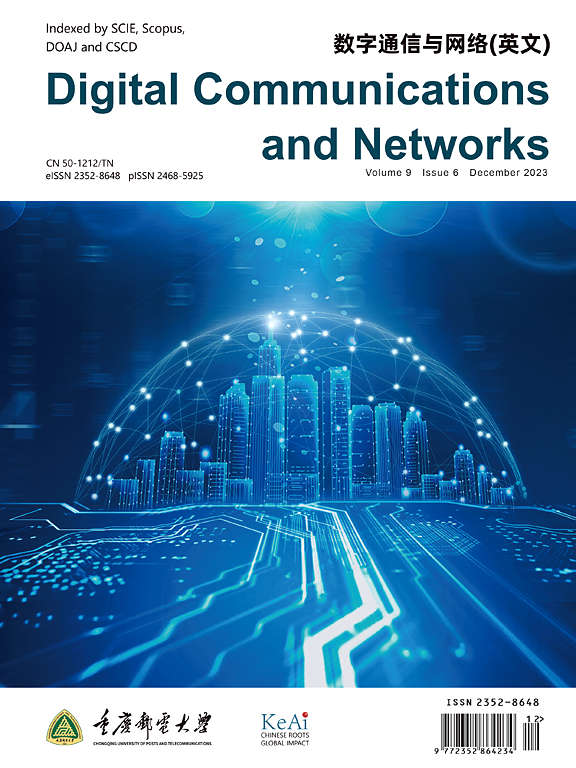Toward next-generation networks: A blockchain-based approach for core network architecture and roaming identity verification
IF 7.5
2区 计算机科学
Q1 TELECOMMUNICATIONS
引用次数: 0
Abstract
With the evolution of next-generation communication networks, ensuring robust Core Network (CN) architecture and data security has become paramount. This paper addresses critical vulnerabilities in the architecture of CN and data security by proposing a novel framework based on blockchain technology that is specifically designed for communication networks. Traditional centralized network architectures are vulnerable to Distributed Denial of Service (DDoS) attacks, particularly in roaming scenarios where there is also a risk of private data leakage, which imposes significant operational demands. To address these issues, we introduce the Blockchain-Enhanced Core Network Architecture (BECNA) and the Secure Decentralized Identity Authentication Scheme (SDIDAS). The BECNA utilizes blockchain technology to decentralize data storage, enhancing network security, stability, and reliability by mitigating Single Points of Failure (SPoF). The SDIDAS utilizes Decentralized Identity (DID) technology to secure user identity data and streamline authentication in roaming scenarios, significantly reducing the risk of data breaches during cross-network transmissions. Our framework employs Ethereum, free5GC, Wireshark, and UERANSIM tools to create a robust, tamper-evident system model. A comprehensive security analysis confirms substantial improvements in user privacy and network security. Simulation results indicate that our approach enhances communication CNs security and reliability, while also ensuring data security.
迈向下一代网络:基于区块链的核心网络架构和漫游身份验证方法
随着下一代通信网络的发展,确保核心网(CN)架构的健壮性和数据安全已成为重中之重。本文提出了一种专门为通信网络设计的基于区块链技术的新框架,解决了CN体系结构和数据安全中的关键漏洞。传统的集中式网络架构容易受到分布式拒绝服务(DDoS)攻击,特别是在漫游场景中,还存在私有数据泄露的风险,这对运营提出了很高的要求。为了解决这些问题,我们引入了区块链增强核心网络架构(BECNA)和安全分散身份认证方案(SDIDAS)。BECNA采用区块链技术实现数据分散存储,通过减少单点故障,提高网络的安全性、稳定性和可靠性。SDIDAS利用分散式身份(Decentralized Identity, DID)技术保护用户身份数据,简化漫游场景下的身份验证,显著降低跨网络传输过程中的数据泄露风险。我们的框架使用以太坊、free5GC、Wireshark和UERANSIM工具来创建一个健壮的、防篡改的系统模型。一项全面的安全分析证实了在用户隐私和网络安全方面的实质性改进。仿真结果表明,该方法提高了通信cnn的安全性和可靠性,同时保证了数据的安全性。
本文章由计算机程序翻译,如有差异,请以英文原文为准。
求助全文
约1分钟内获得全文
求助全文
来源期刊

Digital Communications and Networks
Computer Science-Hardware and Architecture
CiteScore
12.80
自引率
5.10%
发文量
915
审稿时长
30 weeks
期刊介绍:
Digital Communications and Networks is a prestigious journal that emphasizes on communication systems and networks. We publish only top-notch original articles and authoritative reviews, which undergo rigorous peer-review. We are proud to announce that all our articles are fully Open Access and can be accessed on ScienceDirect. Our journal is recognized and indexed by eminent databases such as the Science Citation Index Expanded (SCIE) and Scopus.
In addition to regular articles, we may also consider exceptional conference papers that have been significantly expanded. Furthermore, we periodically release special issues that focus on specific aspects of the field.
In conclusion, Digital Communications and Networks is a leading journal that guarantees exceptional quality and accessibility for researchers and scholars in the field of communication systems and networks.
 求助内容:
求助内容: 应助结果提醒方式:
应助结果提醒方式:


